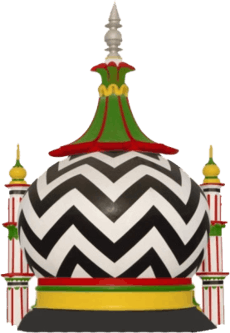Jamiat Ulema-e-Pakistan
 |
| This article is part of a series on the politics and government of Pakistan |
| Constitution |
|
The Jamiat Ulema-e-Pakistan (JUP) (Urdu: جميعت علماء پاکستان) (Assembly of Pakistani Clergy) is a political party in Pakistan usually seen as being political vehicle for the religious Barelvi strain of Sunni Islam.
History
JUP was founded after the founding of Pakistan in 1948 by Khwaja Qamaruddin Sialvi and Shaikh ul Quran Mawlana Mohammad Abdul Ghafoor Hazarvi. The All India Sunni Conference (AISC) converted itself as the Jamiat Ulema-e-Pakistan at Pakistan Level in March 1948. [1] He headed the party until 1970, and was succeeded by Abdul Hamid Qadri Badayuni, Khwaja Qamar ul Din Sialvi, Syed Faiz-ul Hassan Shah, Abdul Sattar Khan Niazi, Shah Ahmad Noorani Siddiqi and Shah Anas Noorani (until his resignation in March 2008).[2]
Electoral performance
It was part of the right-wing Islamic Muttahida Majlis-e-Amal alliance, that won 11.3% of the popular vote and 53 out of 272 elected members in the 20 October 2002 legislative Pakistani elections, and 2.21% of the popular vote and 7 out of 272 elected members in the 18 February 2008 elections. On 12 May 2009 JUP became one of eight parties of the Barelvi school of thought to form the Sunni Ittehad Council (SIC) to "fight the growing Talibanisation in the country".[3] In the 2013 elections Sunni Ittehad Council received just 0.08% of the popular vote and no seats in parliament. Both the Mutthuda Majlis-e-Amal and Jamiat Ulema-e-Pakistan (Niazi) received less than 100 votes nationwide (0.00% of the popular vote).
References
- ↑ https://books.google.com.pk/books?id=WgFeAwAAQBAJ&pg=PA135&lpg=PA135&dq=All+India+Sunni+Conference+Jamiat+Ulema-e-Pakistan&source=bl&ots=609IhV4fKT&sig=aOOnmqNO3Qay-8i5z219yP3A0vs&hl=en&sa=X&ved=0ahUKEwjRouDG4Z_JAhXEGo4KHYv_Av4Q6AEIPzAG#v=onepage&q=All%20India%20Sunni%20Conference%20Jamiat%20Ulema-e-Pakistan&f=false
- ↑ Anas Noorani resigns from office of JUP president Daily Times, March 3, 2008
- ↑ "Jamiaat-e-Ulamma-Pakistan [JUP] Jamiat Ulema-e-Pakistan [JUP] Assembly of Pakistani Clergy Jamiat Ulema-i-Pakistan, Niazi faction (JUP/NI) Jamiat Ulema-i-Pakistan, Noorani faction (JUP/NO)". Global Security. Retrieved 13 April 2015.
